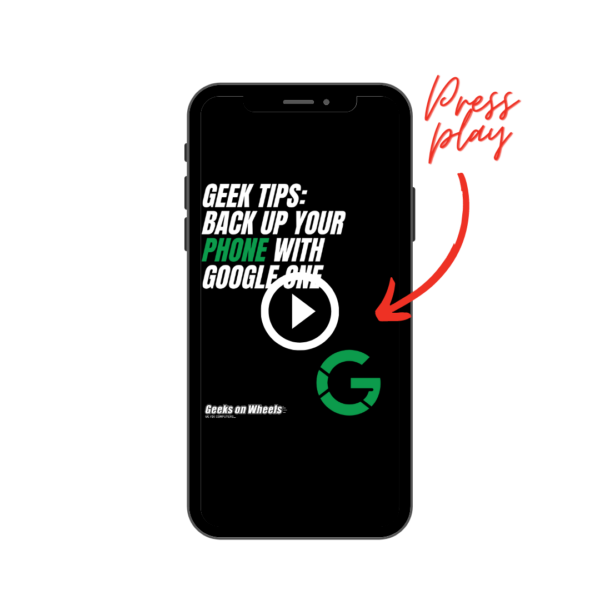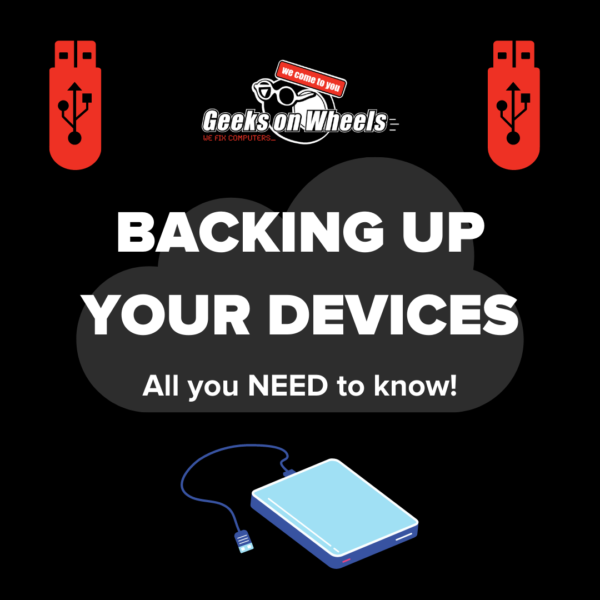Hi Geek Fans! This month we’re discussing backups. We all know we should probably be doing them, but it’s easy to let it fall by the wayside. Here’s a little more you should know about backing up your devices.
Have you ever lost a phone? Dropped it in a lake, had it shattered completely, or had it simply stopped working? How about a laptop? These devices have become so integral in our lives that losing one can be a massive loss. They often hold photos, videos, important work information, and much more, and the sudden loss of a device can be devastating for a number of reasons. Using a laptop case and a tough cover for your smartphone are good practical steps that can help prevent catastrophic damage, but when anything can go wrong, it’s best to have a plan B – a backup.
What does it mean to back up your devices?
To back up your devices means to save all of their important information somewhere else. This can mean just a selection of things you wish to save, such as contacts and photos, or simply everything. You then keep that secondary record somewhere separate and safe. This means that should you suddenly lose your device or if it becomes damaged beyond repair, you only lose the actual hardware – and none of the important data it contains.
One thing to remember when backing up your devices is that one is not enough. Even seldom backups are not enough. It’s actually important to back them up quite regularly.
- For businesses, this usually means doing daily (or even hourly!) backups. That’s because there is so much new information generated and saved all the time, that even losing a day’s worth of work would be a massive problem.
- For ordinary users, you might not need to be quite regimented and back up every hour, but ask yourself how much data you could afford to lose. If that’s only one day, then you should back up every day. If you could lose a week or two of data, then back up every week or two.
And just in case, it’s also best to have more than one backup. For example, if someone were to break into your home and take your laptop and your hard drive with the backup, you’d still have another backup somewhere else.
The best options for backing up your devices
So, what’s the best way to actually back up your devices? Ideally, your system should include:
- More than one backup
- Backups and devices are all stored in different locations
- Backups that are password protected
- Regular backups (daily, weekly, or monthly)
- Bolstered with other security measures such as anti-malware software and password protections
And here are some of the best ways to back up your devices:
- Cloud storage: Solutions such as OneDrive or iCloud offer reliable online storage. You can set these systems to back up regularly in the background for set-and-forget backups.
- External hard drives: An external hard drive is a small device that has a large amount of storage space for backing up your devices. You will need to manually do the backup, then store the hard drive separately.
- USB flash drives: These small flash drives have limited space, but can be useful in a pinch for small amounts of data.
Enter our March giveaway for your chance to WIN 1x Seagate 2TB Portable Hard Drive + a Geek+ membership.
Backing up your device to the cloud? Check out our handy tutorials


Get back up and recovery assistance from Geeks on Wheels
Geeks on Wheels often assists businesses, families, and individuals set up secure backups for their devices. We also often help with data recovery when things go wrong without a backup in place.
Whether you’re looking to set up reliable backups or if you need us to try to recover data from your devices, get in touch to book a Geek today.
